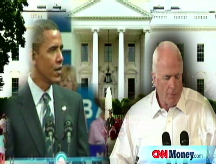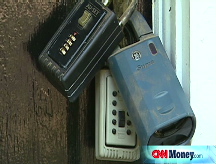Sizing up the economic threat
What's the real danger propelling the largest government intervention in history? The bailout is expensive. But so may be the cost of inaction.
NEW YORK (CNNMoney.com) -- Helping Main Street or sticking it to Main Street?
That's the question taxpayers are asking when told their representatives in Congress are likely to pass a bill that would allow the Treasury to spend up to $700 billion to buy up toxic assets from financial institutions.
To listen to what CNNMoney.com readers are saying, they're more in the "sticking it to Main Street" camp and they're none too pleased.
It certainly is unfair that Wall Street couldn't take care of its own mess without asking taxpayers to step in and save the day.
But like a house on fire that's threatening to spread quickly through the neighborhood, the first priority is to put the fire out - not yell at the arsonist - supporters of the bailout would contend.
To hear Treasury Secretary Henry Paulson and Federal Reserve Chairman Ben Bernanke tell it, if something isn't done quickly to address the frozen credit markets, the U.S. economy is at risk of seizing up and squeezing the financial bejesus out of everyone.
The two men made their case to lawmakers last week, and judging from lawmakers' response, it worked. When Paulson and Bernanke finished, "there was dead silence in the room for five to 10 seconds. The oxygen went out of the room," Senate Banking Committee Chairman Christopher Dodd, D-Conn., told CNN.
So what visions of economic peril knocked the wind out of them? Nothing less than the decimation of three staples of Americans' financial security: jobs, homes and savings.
"The biggest help we can give the American people is to stabilize our financial system right now and to prevent the system from clogging up, because if it does clog up, this is going to have an adverse effect on people's abilities to get jobs, on their budgets, on their retirement savings, on lending for small businesses. And so, that's where the first priority has got to be," Paulson said on Sunday.
There's risk involved no matter what lawmakers decide to do eventually. And Bernanke, an expert on the Great Depression, has said that the economy could suffer badly if the government doesn't do something quickly.
Last week, the commercial paper market - the place businesses go to get very short-term loans to fund their daily business operations - froze. The money spigot, in essence, shut off. More episodes of that would mean companies could come very close to not being able to meet payroll or pay their bills within a few weeks or months, said economist Mark Zandi.
Left without paychecks, workers would stop paying as much tax to the federal, state and local governments. Instead, they would be drawing on government subsidies, such as unemployment benefits, and pushing government spending up at exactly the same time revenues go down.
Consumers and small businesses wouldn't be able to get loans because banks would stop lending and that would slow economic growth. Corporate profits would fall, which would hit government coffers as well.
At the local level, if housing prices continued to fall, so too would property taxes collected by counties and towns. What would that mean? Less funding for schools and municipal services.
The commercial paper market froze for a host of reasons, but key among them was a loss of confidence in the system. The risk going forward for the economy is "a complete psychological breakdown," Zandi said. "There's a reasonably high probability the system would shut down."
And that could extract a much larger toll on Americans long-term than pledging to spend up to $700 billion today.
Zandi suspects the government may not end up spending the full $700 billion for a couple of reasons.
First, not everyone with mortgage assets will want to sell to Uncle Sam. Second, there may not be $700 billion worth of unsavory mortgage assets left to buy since banks have already written down $600 billion worth of them.
He noted that the markdowns taken have included very few for losses on commercial mortgages. "The program could be very helpful in this regard. But not $700 billion worth. This is as much symbolic as it is substantive," Zandi said. "It sends a strong message that the government is backstopping the financial system."
That's the optimistic scenario. Since putting out its original proposal to Congress early Saturday morning, the Treasury has since amended its request to allow for authority to buy up not just troubled mortgage assets, but troubled assets period.
"Removing troubled assets will begin to restore the strength of our financial system so it can again finance economic growth," according to a statement on the Treasury Web site.
That doesn't mean a bailout wouldn't extract a price, too.
Zandi thinks the government will eventually make money on its investments in AIG and Fannie Mae and Freddie Mac. But if there ends up being a net cost to taxpayers from all the bailouts Paulson and Bernanke have orchestrated since last March he thinks it will be in the range of $100 billion to $200 billion.
"That's a lot of money and it's certainly painful," Zandi said. "It's money that won't go into bridges and schools. It's a huge opportunity cost."
And it will add to the deficit, which will add to the country's fiscal problems - most notably, the long-term funding challenges posed by Medicare and Social Security.
The potential net cost to taxpayers could be higher, if in fact the Treasury opts to buy troubled non-mortgage-related assets, such as car loans, which have been showing increasing default rates.
But, Zandi believes, "the cost of doing nothing is immeasurably greater." ![]()






